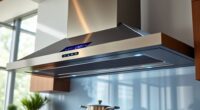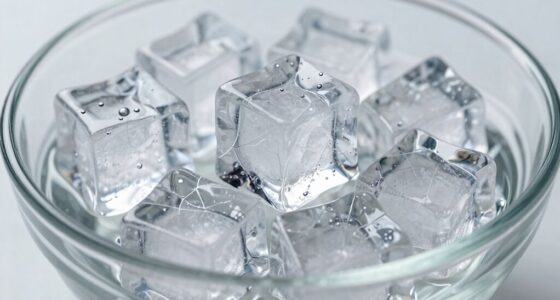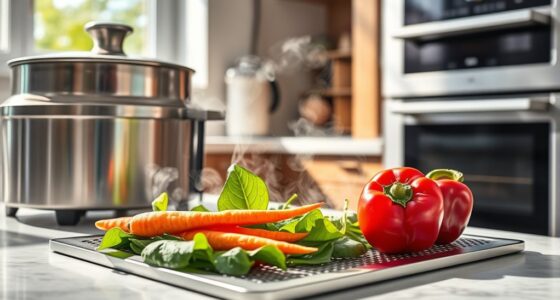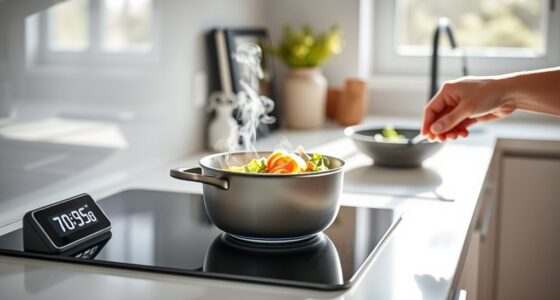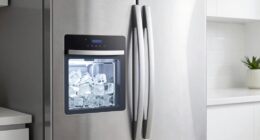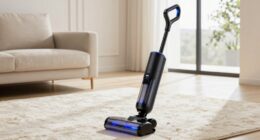Antimicrobial surfaces in kitchen appliances help you maintain a safer, cleaner environment by actively reducing bacteria, mold, and other germs. Technologies like copper coatings provide ongoing protection, while UV sterilization quickly eliminates microbes on contact. These features lower the risk of cross-contamination and make cleaning easier. By incorporating these surfaces, your kitchen becomes healthier and more hygienic. Keep exploring to discover how these innovations can enhance your kitchen safety even further.
Key Takeaways
- Antimicrobial surfaces in appliances reduce bacteria, mold, and pathogens, enhancing kitchen hygiene and food safety.
- UV sterilization technology quickly eliminates germs on appliance surfaces without chemicals.
- Copper coatings provide continuous, passive antimicrobial protection inside appliances like refrigerators and sinks.
- Combining UV and copper technologies offers comprehensive, long-lasting microbial control in the kitchen environment.
- These surfaces simplify cleaning routines, lower contamination risks, and promote healthier cooking spaces.
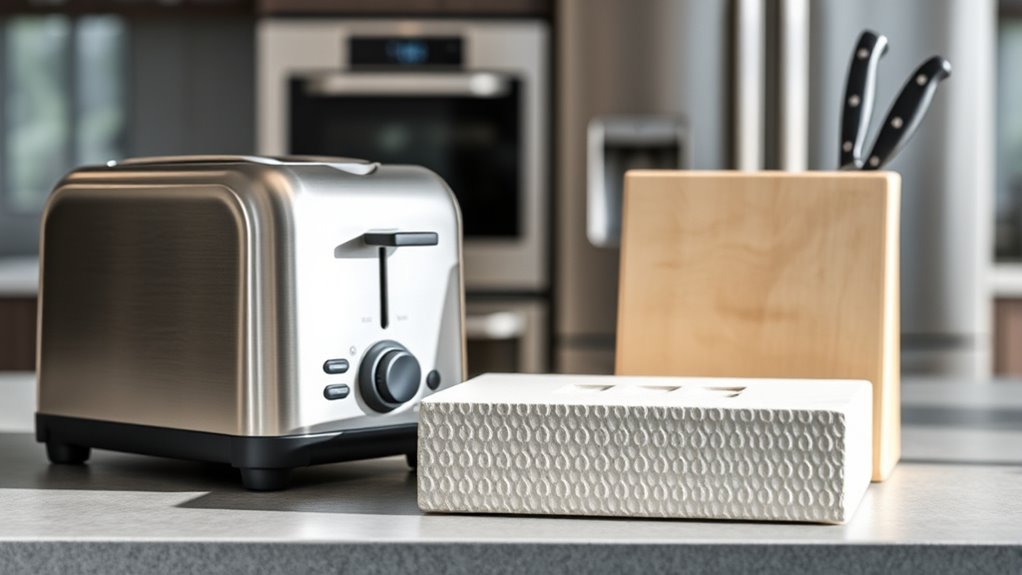
In today’s kitchens, antimicrobial surfaces in appliances are transforming food safety and hygiene. These innovative features help reduce the risk of bacteria, mold, and other pathogens that can compromise your health. As you look for ways to keep your kitchen cleaner and safer, understanding how these surfaces work can make a real difference. Two key technologies leading the charge are UV sterilization and copper coatings, both of which actively combat microbial growth.
UV sterilization uses ultraviolet light to eliminate germs on appliance surfaces. When you activate this feature, UV light penetrates the cell walls of bacteria and viruses, destroying their DNA and rendering them harmless. It’s a quick, chemical-free process that you can often trigger with the press of a button. This method is especially effective in areas that are hard to clean manually, such as inside refrigerators or on the surfaces of microwave interiors. By incorporating UV sterilization into your appliances, you reduce the likelihood of cross-contamination, making your food prep environment considerably safer.
UV sterilization uses UV light to quickly and safely eliminate germs on appliance surfaces.
Copper coatings, on the other hand, offer a passive yet highly effective antimicrobial barrier. Copper is naturally antimicrobial, meaning it kills bacteria and fungi on contact without the need for cleaning agents or special maintenance. When applied as a coating inside appliances like refrigerators, ovens, or even sink handles, copper continuously works to inhibit microbial growth. You won’t have to worry about constant scrubbing or chemical residues—copper’s properties do the heavy lifting for you. Plus, copper’s durability ensures that these coatings will last long-term, providing ongoing protection without additional effort.
Both UV sterilization and copper coatings complement each other well. UV light provides a rapid, on-demand sterilization process, ideal for regular sanitation routines, while copper coatings offer a persistent antimicrobial defense that’s always working in the background. When integrated into your kitchen appliances, these surfaces help minimize bacteria buildup, keep odors at bay, and improve overall hygiene. They also reduce the need for harsh cleaning chemicals, which is better for your health and the environment.
Ultimately, embracing these antimicrobial surfaces means you’re taking proactive steps to create a cleaner, safer kitchen. Whether it’s through the quick action of UV sterilization or the continuous protection of copper coatings, these technologies empower you to maintain a healthier cooking space with less effort. As appliances continue to evolve, their built-in antimicrobial features will become standard, giving you peace of mind in every meal you prepare.
Frequently Asked Questions
How Long Do Antimicrobial Coatings Last on Kitchen Appliances?
Antimicrobial coatings on your kitchen appliances typically last between 1 to 5 years, depending on usage and cleaning habits. You should monitor their durability lifespan and look for signs of wear or diminished effectiveness. When the coating starts to fade or lose its antimicrobial properties, consider coating renewal to maintain hygiene. Proper cleaning and gentle products can help extend the coating’s effectiveness and lifespan, ensuring your appliances stay cleaner longer.
Are Antimicrobial Surfaces Safe for Food Contact?
Imagine a gentle shield over your kitchen, ensuring food safety with every touch. Antimicrobial surfaces are designed with safe, durable materials that are generally food contact safe when properly tested and approved. They help prevent bacteria buildup without leaching harmful substances, offering peace of mind. Trust in their material durability, knowing they’re crafted to keep your kitchen hygienic while safely protecting your meals.
Do Antimicrobial Surfaces Require Special Cleaning?
Yes, antimicrobial surfaces do require special cleaning. You should maintain regular cleaning frequency to keep them effective, using mild, compatible chemicals to avoid damaging the surface’s properties. Avoid harsh abrasives or incompatible cleaners, as they can compromise antimicrobial effectiveness. Follow the manufacturer’s instructions for cleaning and maintenance to guarantee the surface remains safe and functional, ultimately helping you keep your kitchen appliances hygienic and bacteria-free.
Can Antimicrobial Surfaces Prevent All Types of Bacteria?
Antimicrobial surfaces act like shields, but they can’t guard against all bacteria. While they are effective against many common strains, bacterial resistance can develop over time, weakening their defenses. Surface durability guarantees these surfaces stay effective longer, but no surface is foolproof. You should still practice good hygiene, as antimicrobial coatings reduce bacteria but don’t eliminate every germ, especially in a busy kitchen where new bacteria constantly arrive.
Are Antimicrobial Surfaces Effective Against Viruses?
Antimicrobial surfaces can be effective against some viruses, but their viral resistance varies. You should consider coating durability, as a durable coating guarantees ongoing protection. While these surfaces reduce the risk of viral contamination, they may not eliminate all viruses completely. Regular cleaning and proper maintenance are still essential for maximum safety. So, antimicrobial surfaces are a helpful tool but not a foolproof solution against viruses.
Conclusion
Imagine your kitchen as a fortress, where antimicrobial surfaces act as vigilant guards, constantly fighting off germs. Studies show these surfaces can reduce bacterial presence by up to 99%, turning your appliances into safer zones. Just like a shield protects a knight, these surfaces safeguard your health daily. Embracing antimicrobial technology means you’re not just cooking; you’re creating a cleaner, healthier space for you and your loved ones to thrive.

